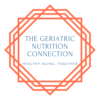Nutrition Tips for a Sick Elder
You’ve already called the doctor. A prescription is on the way. You’ve taken the first steps to help cure the illness, but what do you do now? It’s hard to know what to do to support a sick person, but boosting nutrition can make a huge impact on healing AND health after the illness is gone. In this article, I’ll outline nutrition tips to help you care for a sick elder.
First, I’ll set the nutrition stage.
Your elderly loved one was just diagnosed by the doctor with an infection. They aren’t eating very much and they complain of a poor appetite. Some foods don’t taste good to them. They’re only taking sips of liquids and look like they’ve lost some weight. What’s the next step?
The tips below are for seniors with no other diagnoses that may impact their nutrition or hydration. Always remember to follow instructions from your doctor!
Nutrition Tips for a Sick Elder – Hydration
The #1 focus and goal should be hydration for most sick elders. This is especially true when a person has a fever or diarrhea because both of these conditions can increase fluid needs.
For a fever, water losses increase by 100 to 150 mL per day for each degree of temperature above 98.6 ℉ (1). That is equal to about a 7% increased fluid needs for each degree of fever in Fahrenheit! With a fever of 101.6℉, a person would need to drink about 1 ¼ cup to almost 2 cups per day JUST to make up for fluid losses.
So, when a person is already drinking little and their needs are higher because of illness, it is even more important to get them to drink.
Hydration Ideas
At this point, any liquids are acceptable. Water is the best source of hydration, but tea, juice, milk, soda, and coffee are good offerings depending on what the person is tolerating.
Don’t forget! Foods can be hydrating too!
A good option would be to offer coconut water. 1 cup of coconut water contains 600 mg potassium and 252 mg sodium (2): both are electrolytes that are lost through sweat or diarrhea. Replacing sodium and potassium is important to manage electrolyte balance.
Fluid ideas
- Water
- Juice
- Coconut water
- Watermelon
- Brothy soups
- Jello
- Bone or regular broth
Related post: Hydration and the Elderly
Nutrition Tips for a Sick Elder – Protein
Usually, illness is associated with an infection of some sort. Infections increase the body’s protein needs, so it’s important to give extra protein in any way that’s acceptable to the elder! This could be from foods like cottage cheese or meat. Sometimes liquids are best accepted by someone who’s sick and powdered proteins are the best option.
Bone broth contains more protein than other broths (about 5 to 7 grams of protein per cup depending on the brand), and is a good substitute for broth in a soup or drink. Bone broth could be used to make a chicken noodle soup or warmed in a mug to sip. This is also bonus hydration!
If protein powder is preferred, there are many different types and brands. Collagen powders will dissolve clear and can be taken warm (like in coffee) or cold in an iced beverage. Collagen usually has 10 grams of protein per scoop, but this depends on the brand. Mixing a scoop of collagen protein with coconut water is great for providing hydration, electrolytes, and protein!
Protein ideas
- Bone broth
- Milk
- Cottage cheese
- Meat
- Yogurt
- Tofu
- Lentils
- Protein powder

Nutrition Tips for a Sick Elder – Calories
Calorie needs are usually increased when a person is ill, depending on the specifics of the illness. Calorie needs also depend on how critical the illness is. If the elder is malnourished or underweight before the illness, this also can impact how many calories they need.
Rather than focus too much on an exact number of calories, it is important to encourage the elder to take in foods or drinks as they’re tolerated. Protein and fluids are more important during a time of illness, so focus should be placed there.
Nutrition Tips for a Sick Elder – Probiotics
Probiotics are another area to consider when an elder is ill. These beneficial bacteria reside in the gut and have benefits to the body when consumed. Probiotics are shown to support immune response – this is great when immunity is being challenged!
Sometimes, an elder may be suffering from vomiting and/or diarrhea. Diarrhea and vomiting may be from the primary illness or caused by antibiotics prescribed to treat the illness. Research has shown probiotics benefit antibiotic-associated diarrhea in younger people, though there is limited data to show the same benefits in the elderly (3).
What are some food sources of probiotics?
- Yogurt with live active cultures
- Refrigerated sauerkraut with live active cultures
- Kombucha with live active cultures
- Probiotic supplements (check with your doctor to see if this is appropriate for you)
- Kefir (a fermented dairy product found in the dairy section of the grocery store)
Conclusion
Caring for a sick elderly loved one can be stressful! Nutrition isn’t always the focus of healing, but it can make a huge difference in improving strength and preventing dehydration and weight loss. With these tips, you will have the confidence to provide the foods and drinks that will support your loved one’s healing!
Sources
- Eckstein L, Adams K, eds. Dietetics in Health Care Communities. Pocket Resource for Nutrition Assessment. Chicago, IL: Academy of Nutrition and Dietetics.
- U.S. Department of Agriculture, Agricultural Research Service. FoodData Central, 2019. Fdc.nal.usda.gov.
- https://www.nccih.nih.gov/health/probiotics-what-you-need-to-know


